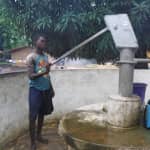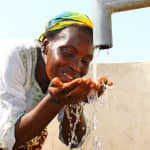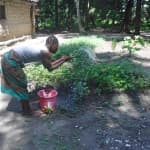Stories from the Field
As we work to provide water, we're committed to helping people like you meet your global neighbors and to realize that we all share the same basic needs. We hope to break down stereotypes and the false distinctions between the so-called winners and losers, rich and poor, the needy and charitable, by introducing you to the people we serve with the respect and admiration they rightfully deserve.
These are stories of hope, told in the words of those who carry out this work every day - our friends in the field.
A Year Later: No Longer Late for School!
Osman S., 17, recalled what life was like in the Masheka Community before his community's well was rehabilitated last year. "Before, to fetch water was difficult for me because it took almost an hour to fetch a single rubber container of water from the swamp source. Also, to practice good hygiene was difficult due to the shortage of water. The s...
A Year Later: Sufficient Water = Improved Gardens!
Khadija Karimu, 55, recalled what life was like in the Suctarr Community before her community’s well was rehabilitated last year. "There were serious constraints of water before the completion of this well in this community. It was difficult to fetch water from other communities," Khadija shared. Collecting water is now much easier for Khad...
A Year Later: Water Helps Save Lives!
Nurse Sadiatu Wurie, the 45-year-old chairperson of the water user committee, recalled what life was like at Malap Community Health Center before her health center’s well was rehabilitated last year. “I want to take this opportunity to say many thanks to you for the immediate response to our aid. Before this time, we were having a lot of pro...
A Year Later: Clean Water Improving Children's Health!
Bintu Sesay, 21, recalled what life was like in the Madina Community before her community's well was rehabilitated last year. "I want to [say] many thanks to you. When this water point was not here, we had to go all the way down to the swamp to fetch water, but [the] water was not good for our health, and as a result of that, so many children we...
A Year Later: Rehabilitated Well Gives Hope!
Jeneba Sboleh, 40, recalled what life was like in the Petifu Junction Community before her community's well was rehabilitated last year. "Before, to get water was a huge problem for me in my village. The only water well I fetched water from was seasonal and was not safe to drink. So, this caused me to fetch water from a far distance. Walking [a]...




